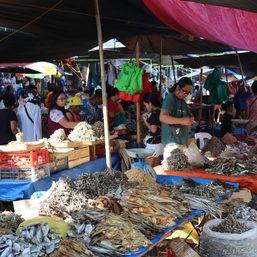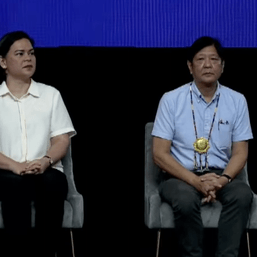SUMMARY
This is AI generated summarization, which may have errors. For context, always refer to the full article.
![[ANALYSIS] Why the fight against inflation isn’t over yet](https://www.rappler.com/tachyon/2023/05/tl-fight-against-inflation.jpg)
For the third month in a row, inflation, or the pace of price increases, has gone down.
In April 2023 it dropped to 6.6%, more than a full percentage point lower than in March.
This means that prices on average are still going up, but slower than before.
The primary reason for this is the declining inflation of food, which often accounts for nearly half of total inflation (Figure 1). Among food items, vegetable inflation eased the most, followed by fish and meat inflation.
The second biggest contributor to overall inflation – housing items like electricity – also eased. Gas prices even went down, resulting in deflation rather than inflation.
Another source of slower inflation is the big decline of transportation inflation, particularly parts and fuel for private vehicles, which also experienced deflation.
In December 2022, transportation was the third largest contributor to inflation and accounted for 1.05 percentage points. But by April 2023, its contribution went down to a mere 0.25 percentage point.
Figure 1.
Some prices are still rising fast
Lower inflation doesn’t mean that all prices are rising much slower.
For instance, over the past six months, the inflation contributions of the following commodities have risen: rice, flour and bread, milk, fruits, ready-made food, and non-alcoholic beverages (Figure 2).
Figure 2.
The contribution of sugar, meanwhile, stays at a high level, as people continue to report high prices in wet markets and supermarkets.
This is weird because prices are supposed to go down amid new imports of sugar. Why the disconnect? Some politicians have pointed to “government-sponsored cartels.” (READ: Is Marcos condoning sugar smuggling and cartels?)
On Monday, May 8, the Senate blue ribbon committee hearing on these alleged anomalies was abruptly deferred since an undersecretary of the Department of Agriculture was abroad. (Incidentally, the night before, the President himself – who serves as the current agriculture secretary – also just came home from the coronation of King Charles III.)
Meanwhile, even with lower electricity inflation and gas deflation, rent inflation remains elevated (Figure 3).
Figure 3.
These days, the third biggest category contributing to inflation is “restaurant and hotel services.” This has to do with “pent-up demand” in the economy, as people eat out at restaurants and hotels left and right in a bid to return to pre-pandemic lifestyles.
Rate hike pause soon?
The easing of food and energy inflation has led to an unusual situation (Figure 4) where headline inflation (the one usually reported in the news) is lower than so-called “core” inflation (excluding items with volatile prices like food and energy).
Figure 4.
This is important. So long as core inflation remains high, the Bangko Sentral, which has been raising interest rates to combat inflation since last year, will not likely stop raising rates yet. At the same time, 6.6% inflation is still way above the government’s 2-4% target.
But at least one member of the Monetary Board – the BSP’s highest policymaking body – hinted that if inflation continues to abate, the BSP may soon pause its rate hikes.
Bangko Sentral Governor Felipe Medalla himself mentioned they’re waiting to see at least six consecutive months of inflation decline before any rate hike pause can be entertained.
If the rate hike pause does happen, that will be a relief for some sectors of the economy since higher rates mean costlier loans.
Other major central banks, like the US Federal Reserve and the European Central Bank, have also been aggressively raising rates since last year. But they may soon put an end to their current “rate hike cycles,” especially since inflation in their respective jurisdictions has been abating as well.
Lucky
Does President Marcos have anything to do with the decline of inflation? Did he bring it about?
In a way, he got lucky that inflation is on the downtrend a few months before his second State of the Nation Address. (Remember that on July 5, 2022, shortly after his inauguration, when he heard about the 6.1% inflation in June, Marcos said, “I think I will have to disagree with that number. We are not that high…”)
World oil prices have been dropping since Marcos took office. In July 2022, Brent crude, an oil price benchmark, was at $111/barrel; by early May 2023, it’s down to a little over $76/barrel.
The greater supply of imported agricultural goods, such as onions – which experienced 200% inflation by end-2022 and came to symbolize inflation – also tempered inflation.
But just as vegetable, fish, and meat inflation are abating, other commodities like rice are seeing accelerating prices.
At the same time, there are potential developments that could stoke inflation again.
The National Economic and Development Authority (NEDA) itself said in its latest inflation press release that it “recognizes the risks to the inflation outlook to remain tilted toward the upside amid potential transport fare increases, wage adjustments, and domestic food supply pressures amidst the threat of El Niño and the resurgence of African Swine Flu.”
These are issues that have little to do with the BSP and its monetary policies. So to avert higher inflation, other government agencies – including the Department of Agriculture, which the President himself controls directly – need to step up.
The fight against inflation isn’t over yet. – Rappler.com
JC Punongbayan, PhD is an assistant professor at the UP School of Economics and the author of False Nostalgia: The Marcos “Golden Age” Myths and How to Debunk Them. JC’s views are independent of his affiliations. Follow him on Twitter (@jcpunongbayan) and Usapang Econ Podcast.
Add a comment
How does this make you feel?




![[In This Economy] Marcos’ POGO ban is popular, but will it work?](https://www.rappler.com/tachyon/2024/07/thought-leaders-marcos-pogo-ban.jpg?resize=257%2C257&crop=255px%2C0px%2C720px%2C720px)
![[Rappler Investigates] POGOs no-go as Typhoon Carina exits](https://www.rappler.com/tachyon/2024/07/newsletter-graphics-carina-pogo.jpg?resize=257%2C257&crop=424px%2C0px%2C1080px%2C1080px)








![[In This Economy] Part 2 | POGOnomics: Are we banning POGOs out of fear, outrage, not rational thought?](https://www.rappler.com/tachyon/2024/06/thought-leaders-pogonomics-part-2b.jpg?resize=257%2C257&crop=292px%2C0px%2C720px%2C720px)
![[In This Economy] POGOnomics: Weighing the costs and benefits of POGOs](https://www.rappler.com/tachyon/2024/06/thought-leaders-pogonomics-part-1.jpg?resize=257%2C257&crop=279px%2C0px%2C720px%2C720px)
![[In This Economy] Is the Philippine economy stable?](https://www.rappler.com/tachyon/2024/05/philippine-economy-stable-may-10-2024.jpg?resize=257%2C257&crop=461px%2C0px%2C1080px%2C1080px)

![[EDITORIAL] Apat na taon na lang Ginoong Marcos, ‘di na puwede ang papetiks-petiks](https://www.rappler.com/tachyon/2024/07/animated-bongbong-marcos-2024-sona-day-carousel.jpg?resize=257%2C257&crop=280px%2C0px%2C720px%2C720px)
![[In This Economy] Delulunomics: Kailan magiging upper-middle income country ang Pilipinas?](https://www.rappler.com/tachyon/2024/07/in-this-economy-upper-middle-income-country.jpg?resize=257%2C257&crop=421px%2C0px%2C1080px%2C1080px)

![[EDITORIAL] Marcos Year 2: Hilong-talilong](https://www.rappler.com/tachyon/2024/07/animated-bongbong-marcos-2nd-sona-carousel.jpg?resize=257%2C257&crop=136px%2C0px%2C720px%2C720px)
![[Newspoint] A fighting presence](https://www.rappler.com/tachyon/2024/07/thought-leaders-a-fighting-presence.jpg?resize=257%2C257&crop=441px%2C0px%2C1080px%2C1080px)
There are no comments yet. Add your comment to start the conversation.